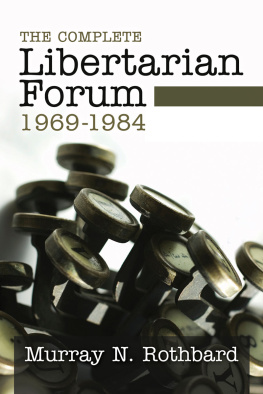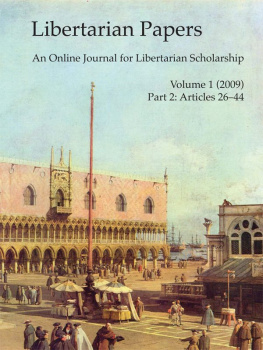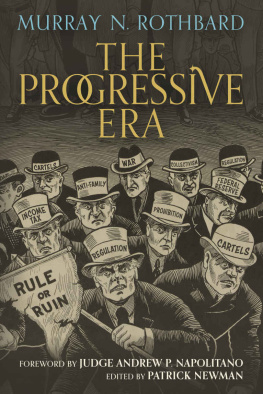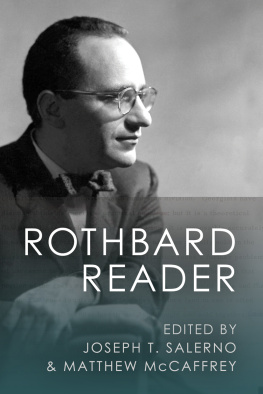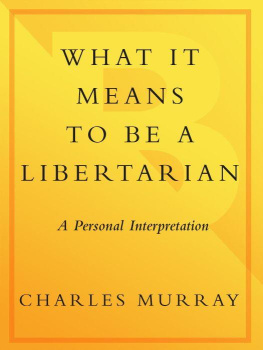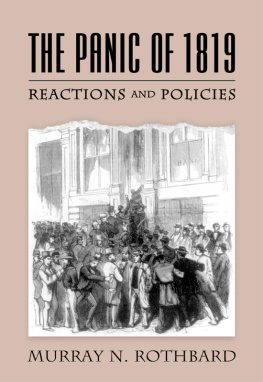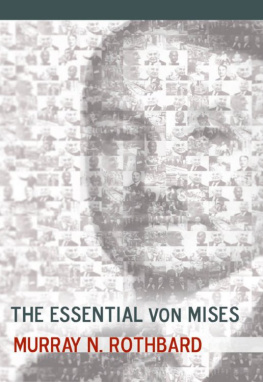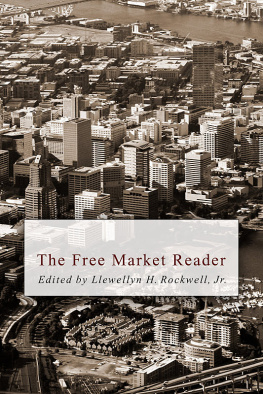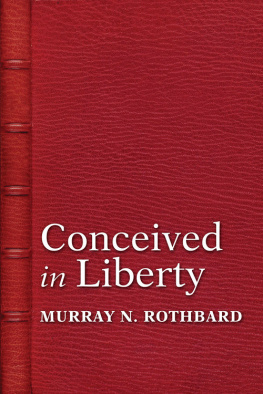The Complete
Libertarian
Forum
19691984
Edited by Murray N. Rothbard


The Ludwig von Mises Institute is dedicated to advancing the Austrian School of economics and libertarian scholarship. Founded in 1982, the Institute defends individual liberty, the free market, private property, sound money, and peace. Its broad range of teaching programs, fellowships, publications, and conferences is supported by voluntary donations. For more information, see , or phone us at 1-800-OF-MISES.
The Ludwig von Mises Institute dedicates this volume to all of its generous donors, and in particular wishes to thank these Patrons.
Steven R. Berger
Walter Block
John Hamilton Bolstad
John Brtland
Carl Creager
George and Joele Eddy
Jos M. Farr
Douglas E. French and Deanna Forbush
Ruby Campbell Hays
Mr. and Mrs. William Lowndes
Nelson and Mary Nash
Don Printz, M.D.
James M. Rodney
Ed and Pat Schoppe
Norman K. Singleton
Joan Thompson
The Mises Institute also thanks Walter Block for suggesting and making possible the publication of Libertarian Forum on the web, and Laurence Vance for the idea for this reprint, and his gathering of the issues and scanning them for publication.
Copyright 2012 Ludwig von Mises Institute and published under the Creative Commons Attribution License 3.0. http://creativecommons.org/licenses/by/3.0/
Ludwig von Mises Institute
518 West Magnolia Avenue
Auburn, Ala. 36832
mises.org
ISBN: 978-1-933550-02-2
eISBN: 978-1-61016-579-2
Contents
Vol. 4.89, AugustSeptember 1972
(This issue features Joseph Peden as editor)
A Semi-Monthly Newsletter
The Libertarian
| Joseph R. Peden, Publisher | Washington Editor, Karl Hess | Murray N. Rothbard, Editor |
| PREVIEW ISSUE | MARCH 1, 1969 | 35 |
Why The Libertarian?
The libertarian movement is growing at a remarkable pace throughout the country. Yet the organizational forms, the means of communication, among libertarians are not only miniscule, but actually suffered a considerable blow during 1968. Last year saw the collapse of the Freedom School-Ramparts College of Palmer Lake, Colorado, with its attendant Ramparts Journal, Pine Tree Press, and Pine Tree Features. New Individualist Review, the theoretical quarterly published by graduate students at the University of Chicago, is all but defunct, and had been moribund for a long time. The need is acute for far more cohesion and inter-communication in the libertarian movement; in fact, it must become a movement and cease being merely an inchoate collection of diffuse and haphazard personal contacts.
The launching of The Libertarian, a twice-monthly newsletter, was announced at the first meeting of The Libertarian Forum, founded by Gerald Woloz and Joseph Peden in New York City for periodic dinners, lectures and discussions among libertarians. The fact that over sixty persons attended this initial dinner-meeting, some coming from as far away as Buffalo, Delaware, and South Carolina for the affair, demonstrates both the rapid growth of the movement and the widespread eagerness for increased activity and organization.
We believe that one of the greatest needs of the movement at this time is for a frequently appearing magazine that could act as a nucleus and communications center for libertarians across the country. We also believe that while many libertarians have thought long and hard about their ideal system, few of them have been able to rise above the merely sectarian exposition of the pure system to engage in a critique of the present state of affairs armed with the libertarian world-view. This kind of critique is not merely negative, as many libertarian sectarians believe. For it is the kind of work that is indispensable if we are ever to achieve victory, if we are ever to get our ideal system off the drawing board and applied to the real world. In order to change the present system we must be able to analyze and explore it, and to see in the concrete how our libertarian view can be applied to such an analysis and to the prospects for social change.
One would think that such a need would be obvious. No movement that has been successful has ever been without organs carrying out this kind of analysis and critique. The key word here is successful; for a magazine like The Libertarian is desperately needed only if we wish to unite theory and action, if we wish not only to elaborate an ideal system but to see how the current system may be transformed into the ideal. In short, it is needed only if our aim is victory; those who conceive of liberty as only an intellectual parlor game, or as a method for generating investment tips, will, alas, find little here to interest them. But let us hope that The Libertarian will be able to play a part in inspiring a truly dedicated movement on behalf of liberty.
The Nixon Administration: Creeping Cornuellism
Changeovers in Administration are always a disheartening time for any thoughtful observer of the political scene. The volume of treacle and pap rises to the heavens, as the wit and wisdom and the high statesmanship of both the outgoing and incoming rascals are trumpeted across the land. But this year things are even worse than ever. First we had to suffer the apotheosis of Lyndon Baines Johnson, before last November the most universally reviled President of modern times; but after November, suddenly lovable and wise. And now Richard Nixon has had his sharp edges dissolved and his whole Person made diffuse and mellow; he too has become uniquely lovable to all. How much longer must we suffer this tripe? It is bad enough that we have to live under a despotic government; must we also have our intelligence systematically defiled? Already, Ted Lewis of the New York Daily News, a dedicated Nixonian, tells us gleefully that the new charm and grace and folksy friendliness of Dick and his aides are so pronounced that maybe this time the Presidential honeymoon will last the full four years.
Amidst the cloud of goo surrounding the new Administration, it has been difficult for anyone to penetrate the fog and figure out what the new President is all about. Of the thousands of top jobs at the immediate disposal of the new Administration, only 90 have been filled. We have been getting inured to both parties and both sets of rulers having the same policies; but now it looks as if the very same people continue in power, regardless of who happens to be chosen by the public. How much clearer can it be that the much vaunted free elections in the United States are a sham and a fraud, designed to lull the public into believing that their votes really count? It had long become physically impossible for any of us to cast a vote against such ageless and lifetime oligarchs as J. Edgar Hoover; now the same applies to almost everyone in government. In the few cases where the same people do not remain, there is a game of musical chairs with a few people shuffling in and out of the usual Establishment institutions: General Dynamics, Cal Tech, Litton Industries, the Chase Bank, etc. Certainly nothing startling can be expected on Vietnam, where Ellsworth Bunker remains as Ambassador, William Bundy, a longtime hawk, remains in the State Department post on Southeast Asia, and Henry Sabotage returns to head the negotiations in Paris.
Next page
